A Sprinkle of Science (and a Flair for the Dramatics)
June 16, 2024
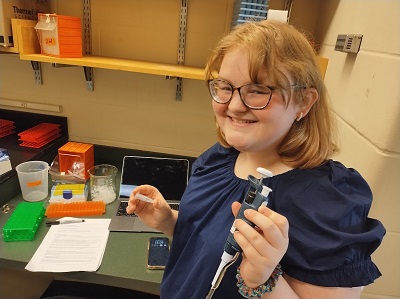 For the past two summers, I have spent my days scooping ice cream and asking people “rainbow or chocolate?” when they ask for sprinkles. The different types of sprinkles essentially taste the same, but you learn quickly that receiving the wrong “flavor” can cause a grown adult to break down into a fit of rage, cursing your bloodline and swearing that you will NEVER see another dollar from them. You’re probably wondering why I would possibly give up the joys of customer service to conduct research at a cancer center, but it turns out that I enjoy biology a lot more than free ice cream!
For the past two summers, I have spent my days scooping ice cream and asking people “rainbow or chocolate?” when they ask for sprinkles. The different types of sprinkles essentially taste the same, but you learn quickly that receiving the wrong “flavor” can cause a grown adult to break down into a fit of rage, cursing your bloodline and swearing that you will NEVER see another dollar from them. You’re probably wondering why I would possibly give up the joys of customer service to conduct research at a cancer center, but it turns out that I enjoy biology a lot more than free ice cream!
My name is Lily Snouffer and I am a rising junior at the University of Delaware. I am a biology major with minors in history and anthropology, which is a fancy way of saying that I love science, but still want to burden myself with writing plenty of papers. I am the president of Riot Act, UD’s only long-form improv troupe, and I am also a member of Phi Delta Epsilon pre-medical fraternity. As you may have gathered, I am interested in becoming a physician. My dream is to be a pediatric rehabilitation specialist, but I have always been interested in conducting research.
I’ve always imagined what it would be like to conduct research in a lab, but it always seemed like something just out of reach. I assumed I must have some sort of qualifications or credentials to be in that position, and I had no idea how to obtain them! When I discovered the Fox Chase Cancer Center Empower Fellowship through a random email, it seemed too good to be true. They’re just going to let undergraduates with no experience into the research labs of seasoned professionals, conducting their studies at a comprehensive cancer center? It sounded like a great idea, but I imagined that tons of impressive students would apply for this fellowship, so I submitted my application, planning to continue my prestigious summer career as an ice cream shop cashier. I was over the moon when I received an email inviting me to interview for the program! Upon my acceptance, I dramatically shed some tears on the phone with my parents, and began reading about my mentor’s research projects. I soon realized I had no idea how to properly read a scientific paper.
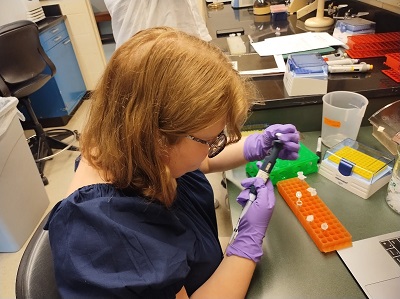 The excitement of being accepted quickly wore off and turned into terror. I’ve never done research before, how am I going to fit in with the researchers? Will they have enough patience for my lack of experience and insurmountable questions? Will they tolerate my flair for the dramatics? How on earth am I going to understand these research papers? Thankfully, Dr. Leystra and Dr. Purdy planned well for preparing us to work in the lab. Our first week of “research bootcamp” helped us in many areas of research, with some of it being physical lab techniques, while others were more focused on the “mental” parts - how to read a scientific paper, how to keep a well-formatted lab notebook, among other things. Even though I was still nervous to get started in my lab the following week, I felt more confident knowing that I had some background basics as well as 11 other friends who were in the same situation as me. Did I mention how much I love the rest of the Empower fellows? A couple of us went into the city together the weekend after research bootcamp, and I had what was possibly the best bowl of soup I’ve ever encountered! I have decided the celestial powers of the universe brought me this soup as an omen, a harbinger of prosperity in the lab. A good bowl of soup before embarking on a research journey can only be explained through supernatural means! Soup-ernatural, if you will.
The excitement of being accepted quickly wore off and turned into terror. I’ve never done research before, how am I going to fit in with the researchers? Will they have enough patience for my lack of experience and insurmountable questions? Will they tolerate my flair for the dramatics? How on earth am I going to understand these research papers? Thankfully, Dr. Leystra and Dr. Purdy planned well for preparing us to work in the lab. Our first week of “research bootcamp” helped us in many areas of research, with some of it being physical lab techniques, while others were more focused on the “mental” parts - how to read a scientific paper, how to keep a well-formatted lab notebook, among other things. Even though I was still nervous to get started in my lab the following week, I felt more confident knowing that I had some background basics as well as 11 other friends who were in the same situation as me. Did I mention how much I love the rest of the Empower fellows? A couple of us went into the city together the weekend after research bootcamp, and I had what was possibly the best bowl of soup I’ve ever encountered! I have decided the celestial powers of the universe brought me this soup as an omen, a harbinger of prosperity in the lab. A good bowl of soup before embarking on a research journey can only be explained through supernatural means! Soup-ernatural, if you will.
So far, I have spent exactly one week in Dr. Astsaturov’s lab. His research is mainly focused on lipid metabolism and how it affects pancreatic cancer, especially how it affects cell signaling and growth. My project is focused on the ERK2 gene. ERK2 (Extracellular Signal-Regulated Kinase 2) is a key protein kinase in the MAPK/ERK signaling pathway, which regulates cell division, differentiation, and survival. Dysregulation of this pathway, often due to mutations, can lead to uncontrolled cell proliferation and contribute to the development and progression of cancer. One part of my project is to introduce a specific mutation, Q103G, into the ERK2 gene and attempt to identify substrates that bind to the ERK2 protein. The goal is to determine what substrates accelerate or halt activity of ERK2. If we can figure that out, then therapies can be developed to target ERK2 and potentially halt cancer growth by interrupting the pathway. Truthfully, I am still wrapping my head around the concept, but I am looking forward to continuing this project. By the end of the summer, I just might be able to explain it without looking at my notes! Here’s to productive research, wonderful friends, and a mystical bowl of soup. Cheers!
The Wild West(ern blot)
July 14, 2024
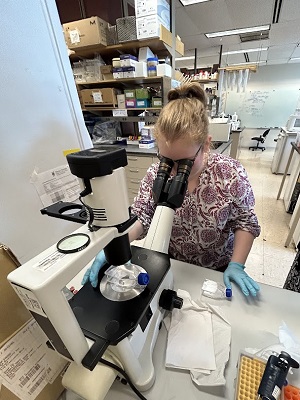 I have made it about halfway through the program and I feel a bit stunned with how much independence I have gained in such a short time! I have spent my days in the cell culture hood, plating cells, collecting lysates, and running western blots. Once I was able to demonstrate that I was able to perform the skills in front of my mentor and lab manager, I was able to run experiments and complete tasks completely on my own. I still struggle with feeling “unqualified”, but it is a great feeling to be able to work on my own and successfully go through the protocols without needing frequent assistance. Don’t get me wrong, I am still very much an amateur, but being able to change the media in my cells or develop films in the dark room on my own is very exciting!
I have made it about halfway through the program and I feel a bit stunned with how much independence I have gained in such a short time! I have spent my days in the cell culture hood, plating cells, collecting lysates, and running western blots. Once I was able to demonstrate that I was able to perform the skills in front of my mentor and lab manager, I was able to run experiments and complete tasks completely on my own. I still struggle with feeling “unqualified”, but it is a great feeling to be able to work on my own and successfully go through the protocols without needing frequent assistance. Don’t get me wrong, I am still very much an amateur, but being able to change the media in my cells or develop films in the dark room on my own is very exciting!
In our experiment, we aim to understand the behavior of ERK2 in different cell types. ERK2 is a protein that influences cell growth and division, and when it's overactive, it can lead to uncontrolled cell proliferation, contributing to cancer development. We use six cell lines: three normal controls and three mutants. We place these cells into four separate dishes; one dish has normal media, while the other three have media with EGF, a substance that stimulates cell activity. We collect cell samples from the EGF dishes at 30 minutes, 60 minutes, and 120 minutes to observe changes in protein expression over time. By breaking open the cells, we analyze the contents (lysates) using a technique called a Western blot, which allows us to see specific proteins, namely FRA1, c-MYC, and RSK. These proteins play crucial roles in cell behavior, and they are all activated by ERK2. By studying these proteins, we can learn more about how cells behave, especially in the context of cancer. If we can demonstrate that mutating regions of ERK2 affects expression of these proteins, then it is possible to develop drugs that can target the different regions of ERK2 and prevent overexpression of proteins like FRA1. When analyzing the results of a western blot, the strength of the bands on the blot indicates the protein levels. We use a computer to measure these bands and create graphs to compare protein levels between normal and mutant cells over time. This helps us determine how the mutations affect protein production, especially when stimulated by EGF.
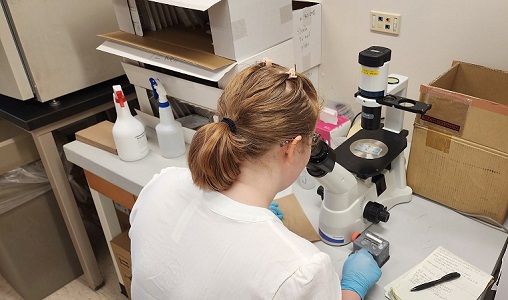 Upon learning that Western blots have nothing to do with the Wild West, I have woefully laid down my lasso and sent my horse back to the stable. However, I am finally able to do the entire process on my own, and the power is really going to my head! There are a lot of steps to a Western blot and it is a multi-day process, so being able to do it independently is very exciting. My experiments have yielded consistent results so far, and I feel very confident in running these experiments on my own. The rest of the summer will consist of more replicates of my experiment and compiling data for the final presentation. Whether I arrive at the symposium in chaps and spurs is still up in the air, but I believe there are no horses allowed on the Fox Chase campus, so any Wild West aesthetic will be from outfit and manner of speech alone. If anyone asks, I was born in San Antonio in the year 1850. Cheers!
Upon learning that Western blots have nothing to do with the Wild West, I have woefully laid down my lasso and sent my horse back to the stable. However, I am finally able to do the entire process on my own, and the power is really going to my head! There are a lot of steps to a Western blot and it is a multi-day process, so being able to do it independently is very exciting. My experiments have yielded consistent results so far, and I feel very confident in running these experiments on my own. The rest of the summer will consist of more replicates of my experiment and compiling data for the final presentation. Whether I arrive at the symposium in chaps and spurs is still up in the air, but I believe there are no horses allowed on the Fox Chase campus, so any Wild West aesthetic will be from outfit and manner of speech alone. If anyone asks, I was born in San Antonio in the year 1850. Cheers!
A Summer of Scientific Growth and Insight
August 26, 2024
This summer, I traded in my ice cream scooper for a pipette, and while I do miss asking, "Rainbow or chocolate?" when people request sprinkles, I’ve found that working with ERK2 mutations is just as fun (and far less likely to result in a grown adult’s meltdown). Yes, I’ve officially gone from serving up sundaes to serving up science, and I’m loving every minute of it!
Throughout this internship, I’ve managed to conduct my experiments without setting anything on fire, and my results have been pretty consistent. The thrill of running my own experiments, analyzing data, and not needing to call my mentor every five minutes has been beyond rewarding. Sure, I still have moments where I feel like a bit of an imposter, but I’ve learned so much in such a short time.
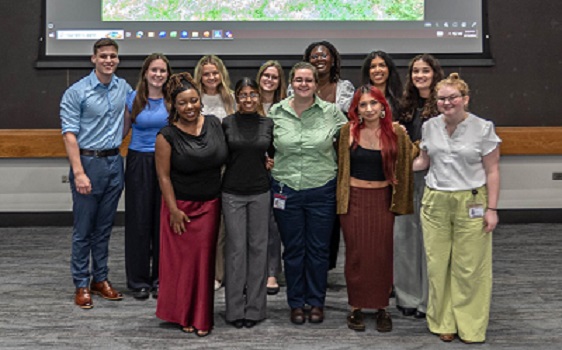 This experience has made one thing clear: I want to keep doing research. In fact, I’m planning to integrate it into my undergraduate studies and, eventually, into my future career as a physician. The idea of being a pediatric rehabilitation specialist who also conducts research to develop new therapies – That sounds like a dream come true.
This experience has made one thing clear: I want to keep doing research. In fact, I’m planning to integrate it into my undergraduate studies and, eventually, into my future career as a physician. The idea of being a pediatric rehabilitation specialist who also conducts research to develop new therapies – That sounds like a dream come true.
As this summer comes to a close, I’m excited to see where my research will take me next. Whether it’s uncovering more about ERK2 or venturing into new scientific territories, one thing is for sure - the lasso will be making a comeback. Cheers to science, sprinkles, and a future filled with discovery!